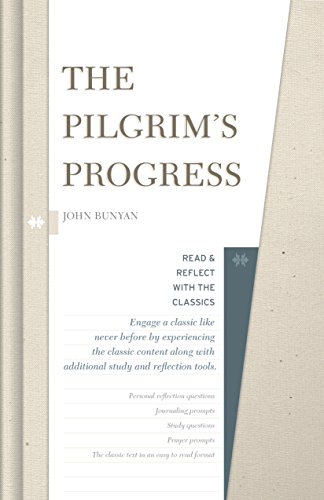-
The Pilgrim's Progress
John Bunyan, W. R. Owens
Paperback (Oxford University Press, April 15, 2009)The Pilgrim's Progress has inspired readers for over three centuries. It is one of the best-loved and most widely read books in English literature and is a classic of the heroic Puritan tradition and a founding text in the development of the English novel. The story of Christian, whose pilgrimage takes him through the Slough of Despond, Vanity Fair, and the Delectable Mountains, is full of danger and adventure. Together with his trusty companions, Faithful and Hopeful, he encounters many enemies--the foul fiend Apollyon, Judge Hategood, Giant Despair of Doubting Castle--before finally arriving at the Celestial City.Bunyan's own experience of religious persecution informs his story, and its qualities of psychological realism, the beauty and simplicity of his prose combine to create a book whose appeal is universal. This edition includes the illustrations that appeared with the book in Bunyan's lifetime, giving a sense of its impact on contemporary readers.About the Series: For over 100 years Oxford World's Classics has made available the broadest spectrum of literature from around the globe. Each affordable volume reflects Oxford's commitment to scholarship, providing the most accurate text plus a wealth of other valuable features, including expert introductions by leading authorities, voluminous notes to clarify the text, up-to-date bibliographies for further study, and much more.
-
The Pilgrim's Progress
John Bunyan, Ella Porter, Audioliterature
Audiobook (Audioliterature, Dec. 31, 2017)"The Pilgrim'S Progress from This World to That Which Is to Come; Delivered under the Similitude of a Dream" is a 1678 Christian allegory written by John Bunyan. It is regarded as one of the most significant works of religious English literature, has been translated into more than 200 languages, and has never been out of print. The protagonist is an everyman character, and the plot centers on his journey from his hometown, the "City of Destruction" ("this world"), to the "Celestial City" ("that which is to come": Heaven). Christian is weighed down by a great burden - the knowledge of his sin - which he believed came from his reading "the book in his hand" (the Bible). Christian finally reaches the "place of deliverance" (allegorically, the cross of Calvary and the open sepulcher of Christ), where the "straps" that bound Christian's burden to him break, and it rolls away into the open sepulcher. The rest follows his adventures through life until he reaches heaven.
-
Pilgrim's Progress
John Bunyan
eBook (Digireads.com, March 30, 2004)Begun while John Bunyan was in Bedfordshire county jail serving time for holding religious services outside the auspices of the Church of England, Pilgrim's Progress is considered one of the greatest works of the English language. "Pilgrim's Progress" is a Christian allegory that concerns the path of one's soul to Heaven. John Bunyan published the first part of the "Pilgrim's Progress" in 1678 with a second part to follow in 1679. Contained here in this volume is both the first and second part of "Pilgrim's Progress."
-
Pilgrim's Progress
John Bunyan
eBook (Digireads.com, March 30, 2004)Begun while John Bunyan was in Bedfordshire county jail serving time for holding religious services outside the auspices of the Church of England, Pilgrim's Progress is considered one of the greatest works of the English language. "Pilgrim's Progress" is a Christian allegory that concerns the path of one's soul to Heaven. John Bunyan published the first part of the "Pilgrim's Progress" in 1678 with a second part to follow in 1679. Contained here in this volume is both the first and second part of "Pilgrim's Progress."
-
Pilgrim's Progress
John Bunyan
eBook (Digireads.com, March 30, 2004)Begun while John Bunyan was in Bedfordshire county jail serving time for holding religious services outside the auspices of the Church of England, Pilgrim's Progress is considered one of the greatest works of the English language. "Pilgrim's Progress" is a Christian allegory that concerns the path of one's soul to Heaven. John Bunyan published the first part of the "Pilgrim's Progress" in 1678 with a second part to follow in 1679. Contained here in this volume is both the first and second part of "Pilgrim's Progress."
-
The Pilgrim's Progress
John Bunyan, George Rhead, Frederick Rhead, Louis Rhead
Hardcover (Calla Editions, May 21, 2014)Universally known for its simplicity, vigor, and beauty of language, this captivating Christian allegory of man's religious journey follows a pilgrim as he travels the hazardous road to the Celestial City. This collectible hardcover masterfully re-creates the most glorious edition ever published of Bunyan's influential 17th-century classic. Louis Rhead and his brothers, George and Frederick, collaborated on this project, which includes an enormous amount of black-and-white artwork, including over 35 full-page illustrations, dozens of smaller motifs, and fabulously ornamented borders for each page of text. T
T
-
The Pilgrim's Progress
John Bunyan
Hardcover (B&H Books, March 1, 2017)The Pilgrim’s Progress was written by John Bunyan in 1678 and is an allegory on the Christian life. It is regarded by many as one of the most significant religious works ever written. This publication gives an added layer by providing thought provoking questions at the end of each chapter, to encourage the reader to dig deeper into the biblical truths present in this classic piece of literature.
-
The Pilgrim's Progress
Steve R. Cleary, Robert Fernandez, Simon Vance, Dreamscape Media, LLC
Audiobook (Dreamscape Media, LLC, Oct. 26, 2019)Undoubtedly, John Bunyan's The Pilgrim's Progress is considered one of the most influential books of all time. For many, it is second only to the Holy Bible and has been enjoyed by generations for more than 340 years. This whimsical allegory follows the adventures of a man named Christian, who, after discovering a book and, subsequently, having a great burden grow on his back, journeys beyond the forbidden borders of his home in search of the Celestial City and its King.
-
The Pilgrim's Progress
John Bunyan
Paperback (CreateSpace Independent Publishing Platform, Oct. 27, 2018)The Pilgrim's Progress from This World to That Which Is to Come by John Bunyan is a bright example of the new Christian allegory of XVII century. The author, son of an ordinary sheet metal worker (rather despised job that had to done by the people with the lowest social status in England), John Bunyan used to be a sinner and ribald before marriage. Only after marrying an orphan Marry, whose only heritage was two books: Plain Man’s Pathway to Heaven by Arthur Dent and Practice of Piety by Lewis Bayly, he started his uneasy way to moral recovery. Considerably soon, Bunyan became a preacher. He was numerously chased by the authorities as well as English Church for his Christian views, baptistic in particular. He began writing The Pilgrim's Progress from This World to That Which Is to Come in prison. The book is questionable and contradictive but written very sincerely and persuasively. This work is probably one of the most famous allegories ever written. The book is translated into many languages. Protestants translated often the book into different languages as the second one after the Bible.
-
Pilgrim's Progress, The
John Bunyan
eBook (Dreamscape Media, June 5, 2018)The Pilgrim's Progress is a 1678 Christian allegory written by the Puritan preacher John Bunyan. Begun while Bunyan served a 12-year jail sentence for his nonconformist preaching, the novel unfolds over two parts, one concerning Christian, and the other his wife Christiana and their sons. Both concern the central characters’ ordeals in traveling from the worldly to the sublime, and are filled with allegorical characters with names like Hypocrisy and Prudence, and places like Plain Ease, and Doubting Castle. Considered one of the most significant works of religious English literature, it has been translated into more than 200 languages, and has never been out of print.
-
The Pilgrim's Progress
John Bunyan
eBookThe Pilgrim's Progress from This World to That Which Is to Come is a Christian allegory written by John Bunyan and published in February, 1678. It is regarded as one of the most significant works of English literature, has been translated into more than 200 languages, and has never been out of print.
-
The Pilgrim's Progress
John Bunyan, Charles S. Baldwin
eBook (Digireads.com Publishing, May 29, 2016)John Bunyan was a man who felt, above all else, the need to preach the word of God. However during 17th century England it was illegal to preach outside the auspices of the Church of England. His failure to obey this law would land him in the Bedfordshire county jail twice, first for a period of twelve years, and then later for a period of six months. Bunyan could have avoided this harsh sentence if he had simply promised not to continue his preaching, however his faith would not allow him to do so. It was during this incarceration that he would begin composition of “The Pilgrim’s Progress,” a work that has come to be regarded as one of the most important works of religious English literature. First published in 1678, “The Pilgrim’s Progress” is a Christian allegory in the same vein of many such works of Bunyan’s time. It concerns the travel of an everyman named Christian who travels from his home, “The City of Destruction”, to “The Celestial City” atop Mount Zion. “The City of Destruction” is a parallel for this world and “The Celestial City” for the next. In this characterization the journey of Christian can be seen as the quest of man to escape the burden of Earthly sin and find salvation for his soul in heaven. This edition contains both the first and second part of “The Pilgrim’s Progress” and includes an introduction by Charles S. Baldwin.